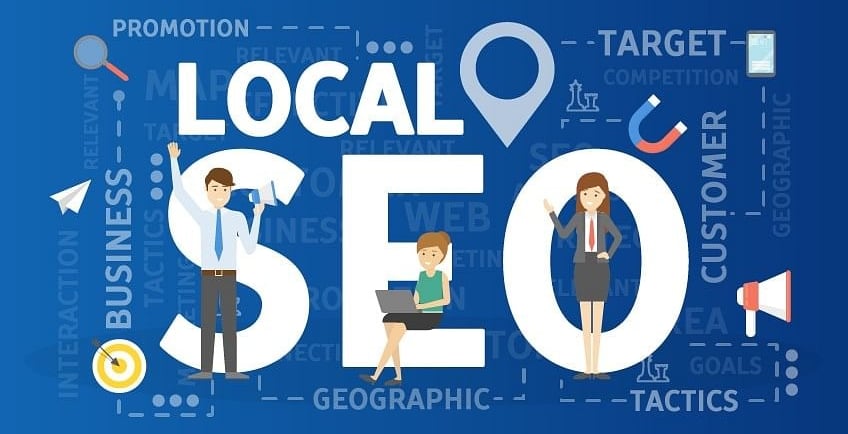Boost Your Business with Local SEO Essentials
Introduction to Local SEO Importance of Local SEO for Modern Businesses
11/5/20246 min read


Introduction to Local SEO
Importance of Local SEO for Modern Businesses
How Local SEO Differs from Traditional SEO
Understanding the Fundamentals of Local SEO
What is Local SEO?
Key Benefits of Local SEO for Small and Medium Businesses
Crafting a Local SEO Strategy
Setting Clear Goals for Your Local SEO Efforts
Identifying Your Target Local Audience
Google My Business: The Cornerstone of Local SEO
Setting Up and Verifying Your Google My Business Profile
Optimizing Your Profile with Keywords and Accurate Information
On-Page Optimization for Local SEO
Utilizing Local Keywords in Titles, Meta Descriptions, and Content
Creating Locally Relevant Content that Resonates
Optimizing NAP (Name, Address, Phone Number) Consistency
Why NAP Consistency Matters for Local SEO
How to Ensure NAP Consistency Across Online Platforms
Building Local Citations and Listings
The Role of Citations in Local Search Rankings
High-Authority Platforms for Local Listings
Collecting and Managing Online Reviews
Importance of Reviews for Local SEO
Tips for Encouraging Positive Customer Reviews
Leveraging Local Link Building
Building Relationships with Local Businesses
Engaging with Local Press for Backlinks
Using Schema Markup for Local SEO
What is Schema Markup?
How to Use Local Business Schema to Stand Out
Optimizing Your Website for Mobile Users
Why Mobile Optimization is Crucial for Local SEO
Steps to Make Your Site Mobile-Friendly
Content Marketing for Local SEO
Creating Location-Based Content for Your Audience
Blogging and Other Content Strategies for Local Engagement
Engaging on Social Media for Local Reach
Social Media's Role in Boosting Local SEO
Best Practices for Local Social Media Engagement
Utilizing Local SEO Analytics
Monitoring and Tracking Local SEO Performance
Key Metrics to Measure Your Local SEO Success
Understanding Voice Search in Local SEO
How Voice Search is Transforming Local SEO
Optimizing for Voice-Activated Devices
Incorporating Video Content in Local SEO
Why Video Content Works for Local Engagement
Ideas for Creating Local-Focused Video Content
Avoiding Common Local SEO Pitfalls
Mistakes to Avoid in Local SEO Campaigns
Quick Fixes for Common Local SEO Errors
Staying Updated with Local SEO Trends
How the Local SEO Landscape is Evolving
Emerging Trends to Watch for in the Future
Case Studies of Successful Local SEO Campaigns
Real-World Examples of Local SEO Success
Key Takeaways from Each Case
Conclusion and Next Steps
Recap of Essential Local SEO Strategies
Taking Action: Implementing Local SEO for Your Business
Boost Your Business with Local SEO Essentials
Introduction to Local SEO
Importance of Local SEO for Modern Businesses
In today’s digital landscape, local search engine optimization (SEO) has become a powerful asset for businesses striving to attract nearby customers. With the rapid growth of mobile usage and voice-activated searches, local SEO helps businesses establish a strong local presence and connect directly with customers searching for nearby services or products.
How Local SEO Differs from Traditional SEO
Local SEO focuses on optimizing a business’s visibility in a specific geographic area, whereas traditional SEO casts a broader net to attract a wide audience. Local SEO relies on techniques like Google My Business optimization, local keywords, and online reviews to ensure a business is prominent in local search results.
Understanding the Fundamentals of Local SEO
What is Local SEO?
Local SEO is a subset of SEO that optimizes a business’s online presence for searches within a local area. When someone searches for a “coffee shop near me” or “local plumber,” local SEO techniques help businesses rank higher in those geographically relevant searches.
Key Benefits of Local SEO for Small and Medium Businesses
Local SEO offers an array of benefits, from driving foot traffic to boosting credibility within a community. Small businesses, in particular, benefit as it level the playing field, allowing them to compete with larger brands on a local level and capture highly targeted leads.
Crafting a Local SEO Strategy
Setting Clear Goals for Your Local SEO Efforts
Establishing clear goals is foundational to any SEO campaign. Determine what success looks like for your business—whether it’s increasing foot traffic, growing online engagement, or boosting in-store purchases.
Identifying Your Target Local Audience
To truly leverage local SEO, it’s crucial to understand your local demographic. Define your ideal customer’s preferences, needs, and behaviors, as these insights will shape your approach to content, keywords, and engagement tactics.
Google My Business: The Cornerstone of Local SEO
Setting Up and Verifying Your Google My Business Profile
Google My Business (GMB) is a pivotal tool for local SEO, allowing businesses to appear in local search results. Create and verify your GMB profile to gain control over your business listing and enhance visibility in Google Maps and local search results.
Optimizing Your Profile with Keywords and Accurate Information
Once your GMB profile is set up, optimize it with relevant keywords, up-to-date contact information, and a detailed business description. Include photos to give potential customers a glimpse into your offerings and establish credibility.
On-Page Optimization for Local SEO
Utilizing Local Keywords in Titles, Meta Descriptions, and Content
Local keywords should be strategically embedded in website titles, meta descriptions, headers, and content. By including specific geographic terms, such as “New York bakery,” you signal relevance to local searchers and search engines.
Creating Locally Relevant Content that Resonates
Develop content that speaks directly to the local audience. Share insights about community events, or blog about topics that matter to local customers, like seasonal menu changes or upcoming holiday sales.
Optimizing NAP (Name, Address, Phone Number) Consistency
Why NAP Consistency Matters for Local SEO
NAP (Name, Address, and Phone Number) consistency across platforms is essential for local SEO. Search engines rely on consistent NAP information to verify a business’s legitimacy and location.
How to Ensure NAP Consistency Across Online Platforms
Audit your business listings on platforms like Yelp, Facebook, and industry-specific directories. Correct any discrepancies to maintain uniform information and improve your search engine credibility.
Building Local Citations and Listings
The Role of Citations in Local Search Rankings
Citations are mentions of your business’s NAP details on other websites. High-quality citations from authoritative sites can increase your business’s local ranking and search visibility.
High-Authority Platforms for Local Listings
Submit your business information to high-authority platforms, including Google My Business, Yelp, and Bing Places. Seek out industry-specific directories relevant to your business, as these citations strengthen your local SEO impact.
Collecting and Managing Online Reviews
Importance of Reviews for Local SEO
Customer reviews are powerful for building trust and improving your local SEO. Positive reviews boost your credibility and can sway potential customers in your favor.
Tips for Encouraging Positive Customer Reviews
Politely encourage satisfied customers to leave reviews by providing easy access to review platforms and responding to each review with gratitude, whether positive or constructive.
Leveraging Local Link Building
Building Relationships with Local Businesses
Form connections with nearby businesses to secure relevant backlinks. Link-building partnerships within your community can improve your site’s authority while enhancing relationships.
Engaging with Local Press for Backlinks
Reaching out to local press or bloggers can help your business gain local coverage and authoritative backlinks. Offering valuable insights, press releases, or participating in community events may lead to quality mentions and links.
Using Schema Markup for Local SEO
What is Schema Markup?
Schema markup is a type of structured data that helps search engines better understand your site’s information, enhancing how your business appears in local search results.
How to Use Local Business Schema to Stand Out
By adding Local Business schema markup, you help search engines display detailed information about your business, such as hours, contact details, and reviews, making your listing more appealing to potential customers.
Optimizing Your Website for Mobile Users
Why Mobile Optimization is Crucial for Local SEO
With many local searches conducted on mobile devices, a mobile-friendly website is essential. Google prioritizes mobile-optimized sites in local search results, to ensure a smooth mobile experience.
Steps to Make Your Site Mobile-Friendly
Optimize images, simplify navigation, and ensure fast loading speeds to enhance mobile usability. A responsive design will adapt your site seamlessly to any screen size.
Content Marketing for Local SEO
Creating Location-Based Content for Your Audience
Focus your content on topics that reflect local interests or needs. Whether it’s a guide to local events or a roundup of seasonal tips, local content fosters engagement.
Blogging and Other Content Strategies for Local Engagement
Blog regularly about community-oriented topics, and explore formats like infographics, lists, and guides to keep your audience informed and engaged.
Engaging on Social Media for Local Reach
Social Media's Role in Boosting Local SEO
Social media increases your brand’s local visibility. Platforms like Facebook, Instagram, and Twitter are effective channels to connect with local customers and direct them to your website.
Best Practices for Local Social Media Engagement
Engage with followers through local hashtags, respond to comments, and create events or promotions exclusive to your local audience.
Utilizing Local SEO Analytics
Monitoring and Tracking Local SEO Performance
Track local SEO metrics, such as local search rankings, click-through rates, and calls from Google My Business.
Growth
Driving local business success through digital marketing.
Contact Us
© 2024. All rights reserved.
